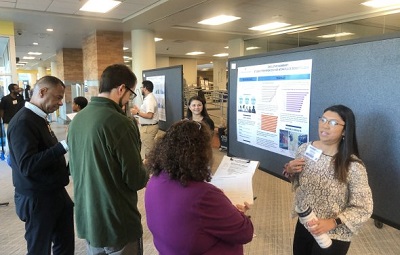Microbial Responses to Methane Enrichment in Deep-Sea Environments: Implications for Methane Sequestration and Climate Mitigation
Description/Abstract/Artist Statement
Methane, a greenhouse gas approximately 25 times the potency of carbon dioxide, emanates from methane clathrates along the East Coast of the United States in ocean depths between 400-600 meters. Methane-consuming bacteria in the ocean prevent methane from reaching the surface where it would contribute as a greenhouse gas although the details of microbial consumption of methane are not well understood. In this study, we examined the response to methane of a deep-sea microbial community collected from the mesopelagic zone (300 meters) at the continental shelf break. Samples were enriched with methane and microbial biomass was determined in a time series. The biomass of prokaryotic and eukaryotic microbes was measured using cell counts under the epifluorescence microscope and adenosine triphosphate as a proxy. Our results showed significant short-term (8 days) and long-term (several weeks) microbial biomass increases, with contributions from both prokaryotes and eukaryotes. The increase of eukaryotic microbes likely results from their predation on methanotrophs rather than direct utilization of methane. Importantly, this process curbs methane emissions by removing methane in the water column, averting its release into the atmosphere. Thus, understanding and harnessing such mechanisms hold promise for mitigating methane's environmental impact.
Faculty Advisor/Mentor
Alexander B. Bochdansky
Faculty Advisor/Mentor Department
Ocean and Earth Sciences
College Affiliation
College of Sciences
Presentation Type
Poster
Disciplines
Environmental Microbiology and Microbial Ecology | Oceanography
Session Title
Poster Session
Location
Learning Commons Lobby @ Perry Library
Start Date
3-30-2024 8:30 AM
End Date
3-30-2024 10:00 AM
Upload File
wf_yes
Microbial Responses to Methane Enrichment in Deep-Sea Environments: Implications for Methane Sequestration and Climate Mitigation
Learning Commons Lobby @ Perry Library
Methane, a greenhouse gas approximately 25 times the potency of carbon dioxide, emanates from methane clathrates along the East Coast of the United States in ocean depths between 400-600 meters. Methane-consuming bacteria in the ocean prevent methane from reaching the surface where it would contribute as a greenhouse gas although the details of microbial consumption of methane are not well understood. In this study, we examined the response to methane of a deep-sea microbial community collected from the mesopelagic zone (300 meters) at the continental shelf break. Samples were enriched with methane and microbial biomass was determined in a time series. The biomass of prokaryotic and eukaryotic microbes was measured using cell counts under the epifluorescence microscope and adenosine triphosphate as a proxy. Our results showed significant short-term (8 days) and long-term (several weeks) microbial biomass increases, with contributions from both prokaryotes and eukaryotes. The increase of eukaryotic microbes likely results from their predation on methanotrophs rather than direct utilization of methane. Importantly, this process curbs methane emissions by removing methane in the water column, averting its release into the atmosphere. Thus, understanding and harnessing such mechanisms hold promise for mitigating methane's environmental impact.

